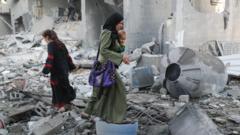Hamas's recent response to a US ceasefire proposal adds another layer of complexity to the ongoing conflict, as they seek amendments along with the potential release of hostages.
Hamas Proposes Hostage Exchange Amid Complex Ceasefire Negotiations

Hamas Proposes Hostage Exchange Amid Complex Ceasefire Negotiations
Hamas expresses willingness to negotiate hostages in exchange for Syrian prisoners, amid ongoing tensions over US ceasefire terms.
In a significant development, Hamas has outlined a conditional proposal regarding hostages as it navigates the intricate landscape of ceasefire negotiations with the United States. The group has declared its readiness to release ten living Israeli hostages alongside eighteen deceased hostages in return for an unspecified number of Palestinian prisoners, while also calling for revisions to the current US ceasefire framework.
The organization has reiterated its demand for an enduring truce, a full Israeli withdrawal from Gaza, and uninterrupted humanitarian aid, none of which are included in the current US offering. This positions Hamas in a precarious situation; their response is neither a conclusive rejection nor acceptance of the US's terms, which Washington claims Israel has agreed to.
US envoy Steve Witkoff has publicly dismissed Hamas's response as "totally unacceptable," asserting that cooperation with the proposed framework is essential to move toward successful proximity talks to secure a ceasefire over the coming days. In a conflicting statement, Israeli Prime Minister Benjamin Netanyahu affirmed Israel's agreement to the updated terms but criticized Hamas for its continued defiance.
Under enormous pressure from the dire humanitarian situation facing 2.2 million Palestinians and the demands from its regional mediators, Hamas finds itself unable to fully embrace an American proposal, which appears less favorable than prior offers they've rejected. Meanwhile, the Israeli government is set to escalate military actions, intensifying the stakes as the conflict continues.
Hamas's new counterproposal indicates its struggle to balance the obligations imposed by its numerous civil pressures against the backdrop of a looming ground offensive from Israel. The key components of the unverified US plan reportedly include a 60-day ceasefire, the exchange of 28 Israeli hostages, the release of 1,236 Palestinian prisoners, and the provision of humanitarian aid through UN agencies.
Israeli leadership, particularly Netanyahu, is under intense scrutiny to address the hostage crisis but maintains that any temporary ceasefire cannot jeopardize Israel’s position. The Israeli government consistently emphasizes the necessity for Hamas to disarm as a precondition to any resolution.
As tensions escalate, the humanitarian toll remains staggering; reported fatalities in Gaza are climbing, with over 54,000 lives lost since hostilities resumed. As the region grapples with these dire circumstances, the complexities of negotiation seem increasingly further away from resolution.
The organization has reiterated its demand for an enduring truce, a full Israeli withdrawal from Gaza, and uninterrupted humanitarian aid, none of which are included in the current US offering. This positions Hamas in a precarious situation; their response is neither a conclusive rejection nor acceptance of the US's terms, which Washington claims Israel has agreed to.
US envoy Steve Witkoff has publicly dismissed Hamas's response as "totally unacceptable," asserting that cooperation with the proposed framework is essential to move toward successful proximity talks to secure a ceasefire over the coming days. In a conflicting statement, Israeli Prime Minister Benjamin Netanyahu affirmed Israel's agreement to the updated terms but criticized Hamas for its continued defiance.
Under enormous pressure from the dire humanitarian situation facing 2.2 million Palestinians and the demands from its regional mediators, Hamas finds itself unable to fully embrace an American proposal, which appears less favorable than prior offers they've rejected. Meanwhile, the Israeli government is set to escalate military actions, intensifying the stakes as the conflict continues.
Hamas's new counterproposal indicates its struggle to balance the obligations imposed by its numerous civil pressures against the backdrop of a looming ground offensive from Israel. The key components of the unverified US plan reportedly include a 60-day ceasefire, the exchange of 28 Israeli hostages, the release of 1,236 Palestinian prisoners, and the provision of humanitarian aid through UN agencies.
Israeli leadership, particularly Netanyahu, is under intense scrutiny to address the hostage crisis but maintains that any temporary ceasefire cannot jeopardize Israel’s position. The Israeli government consistently emphasizes the necessity for Hamas to disarm as a precondition to any resolution.
As tensions escalate, the humanitarian toll remains staggering; reported fatalities in Gaza are climbing, with over 54,000 lives lost since hostilities resumed. As the region grapples with these dire circumstances, the complexities of negotiation seem increasingly further away from resolution.























